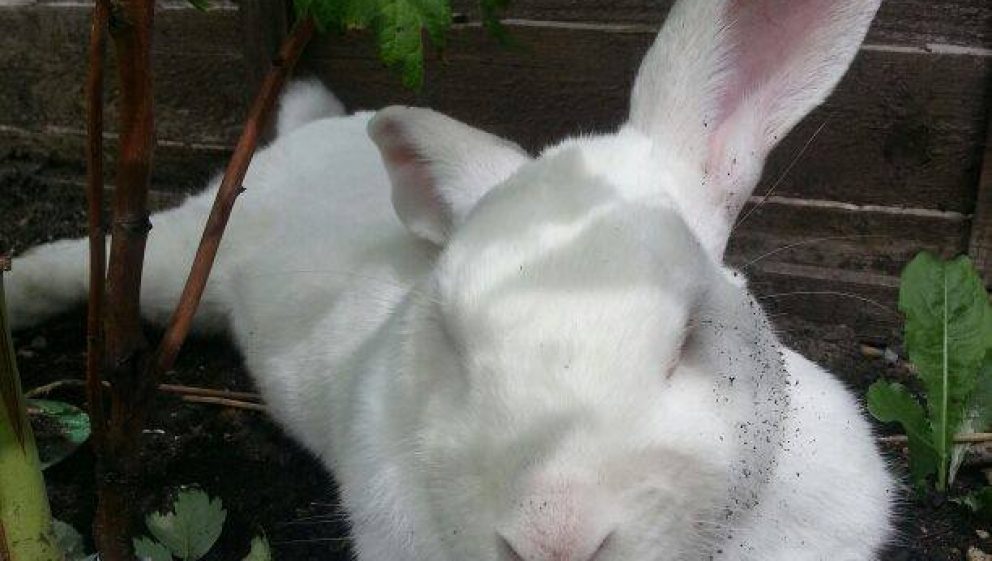Ban on the use of lead shot – finally!
Posted 10 Jul 2025

Posted on the 26th March 2021
An application has been put forward by T&S Rabbits, a rabbit farm 'franchiser', for planning permission to set up a rabbit breeding and rearing operation. There will apparently be 250 females, to produce upwards of 10,000 rabbits per year. They previously created public outrage by trying to set up rabbit battery cage farming systems across the UK. It is clear that the motivation is certainly not animal welfare, but instead profit. All animals should be our friends, not food.
You can still register your objections and sign the Change.org petition, so please do it today, if you haven't already.

Update: The proposal was refused in March 2022.
We have some notes to help with this process.
You can object by submitting a comment on the planning webpage.
Include the Planning Application Number: 2020/1439/FUL
Address: Land Adjacent To Lyndon Top, Lyndon Lane, Hambleton, Rutland
Proposal: Erection of 1 no. Temporary Rural Workers Dwelling and 1 no. Agricultural Building.
View the plans on the council website.
You will need to include your name and postal address in order for it to be valid.
Unfortunately, at this point in time, animal welfare is not a consideration in the planning process. Whilst you may feel the most important factor to mention is animal welfare and suffering, this will not be considered by the authorities. You can of course mention your concerns, but your objection will have more bearing if you focus on a range of alternative points.
Tourism and visitors
– Many people flock to this scenic tourism spot. Lyndon Visitor Centre and a tourist car park are nearby. The site is opposite a popular Wildlife Trusts visitor centre. Every year hundreds of visitors flock to the site to enjoy the annual Bird Fair and enjoy recreational walking and bird spotting throughout the event. It is an important tourist and recreation area. Visitor experience could be marred by the presence of a rabbit and meat farm nearby.
Foul odour and noise
Farming hundreds or even thousands of rabbits on such an intensive scale will undoubtedly produce a great amount of waste and ammonia, which apparently will not be removed, but left on the ground to rot leading to foul odours and flies. This could mar the experience of visitors to this picturesque area.
Special protections
– The lake is a Site of Special Scientific Interest (SSSI), RAMSAR, Special Protection Area (SPA), as classified under the Birds Directive.
– Birdlife International list the site as an Important Bird Area (IBA).
– The site is in a Site of Special Scientific Interest (SSSI) Impact Risk Zone, Special Protection Areas (SPA) (Natural England), Nitrate Vulnerable Zone.
– The site is near a Fragmentation Action Zone, Network Enhancement Zone 1, Priority Habitat: Deciduous Woodland, Lowland Calcareous Grassland, Coastal and Floodplain Grazing Marsh.
– Natural England has designated the site as part of the priority area for Countryside Stewardship measures addressing Lapwing habitat issues. Osprey are also regular visitors.
– The RSPB have identified the site as part of the breeding distribution for a number of rare and declining farmland birds, specifically the Grey Partridge, Lapwing, Turtle Dove, Tree Sparrow, Yellow Wagtail and Curlew.
Rabbits as potential SARS-CoV-2 reservoirs
‘A new study by scientists in the Netherlands in August 2020 shows that the severe acute respiratory coronavirus-2 (SARS-CoV-2) can infect rabbits, which opens the door for possible circulation in rabbit farms and another potential source of animal to human SARS-CoV-2 infection.’
– The proposed type of farming is unacceptable especially in the middle of a pandemic caused by an animal-to-human virus along with new variants now emerging, and this should be taken into serious consideration. The fact that rabbits can be infected with covid could potentially make this a reservoir for the virus.
Disease management
– There are no measures outlined on how they intend to combat the spread of disease in the rabbits. There are no specific drugs licensed for use in ‘meat’ rabbits in the UK, due in a large part to the lack of commercial rabbit farming here. There is no mention of vaccinating the rabbits against the fatal, incurable diseases myxomatosis, VHD and VHD2. There is a concern that disease could pass between wild rabbits and unvaccinated companion rabbits in the vicinity. These diseases are lethal and easily spread between rabbit populations. Many pet rabbits are vaccinated, but many are not, and there is no vaccination programme for wild rabbits.
– There is a risk of outbreaks of coccidiosis if rabbits are not kept in very hygienic conditions with regular cleaning of housing and pens. The rabbits would need to be circulated on range and the ground left fallow for suitable stretches of time. We question how this may be achieved with hundreds if not thousands of rabbits, and in the presence of wild rabbits. Here is some further information about this.
Wildlife
– At a time when we must be doing all we can to protect what little wildlife remains, further encroaching on the little habitat that they have left is the wrong direction of travel.
– There is also a concern for rabbits escaping into the local environment and disturbing the local ecosystem. Rabbits are exceptional diggers and are adept escape artists through tunnelling out.
– A rabbit farm would attract wildlife such as foxes and badgers, and possibly domestic dogs, threatening local conservation efforts. The ‘management’ of predatory species such as foxes may lead to even more cruelty with them being shot instead of humane deterrance being employed.
– There will be a strong and electrified Heras perimeter fence and overhead heras arcs. This would create quite a blot on the landscape.
Slaughter of rabbits and waste
– There is no mention of how the rabbits shall be slaughtered or of how biological waste will be dealt with more widely. If they are to be a ‘small scale producer’ ie ‘producing’ no more than 10,000 rabbits a year, then they may plan to slaughter the rabbits on site. There is nothing in the proposal outlining how waste from this process shall be disposed of, nor how it will be ensured that none of this waste will contaminate the surrounding area.
Waste and pollution
– Individual hutches will need to be regularly cleaned and disinfected. How will all the waste be dealt with? This will all need to be collected, creating more vehicle movements. We question what will happen to the nitrate-rich waste run-off from the farm? This could pollute the nearby lake.
Temporary rural workers’ dwelling
-We have concerns about the set up temporary residence for workers. This could span months or years, and this may just be a ‘foot through the door’ and a permanent house structure may be applied for next, further and permanently blighting the landscape.
– The development would not bring obvious economic benefit to the local area and in real terms could actively reduce this. It looks like just one person will be employed to work at the farm. This is hardly adding much to the local employment. The modest associated economic benefits of this proposal do not outweigh the unsustainable location and harm to the natural qualities of the setting.
Conflicting with Local Planning Policy
– The proposed farm would not be in-keeping with the Council’s adopted Local Planning Policy CS:24 for safeguarding the environs of Rutland Water where new developments will be restricted to small scale and subject to it being appropriate in terms of location, scale, design and impact on the landscape. Allowing this largely undeveloped land to be built on sets a bad precedent for the area, this is at odds with the area’s recognised status.
– The proposed buildings contravene Local Planning Policy CS 24 – Large unsightly farm buildings are not in keeping with the surrounding area, which is largely undeveloped and an SSSI.
Public attitudes to rabbit meat and real fur
– There is little demand for rabbit meat in the UK, and most people are repulsed at the thought of consuming it. Rabbits are mostly viewed as companion or wild animals in the UK. The farm, should it set up, could attract protests and unwanted attention, disrupting local life.
– We understand that fur would likely be produced as a ‘by-product’ which is highly distasteful and ‘fur farming by the back door’.
– There is huge public sentiment against real fur in the UK. A recent YouGov poll by Humane Society International revealed that the vast majority (93%) of people in Britain don’t wear real animal fur and do support a #FurFreeBritain.
*You may like to mention the following in passing, however they will not be taken into account in the decision-making process*
-Grave concerns for the welfare of the rabbits to be farmed as there is no substantial species-specific legislation protecting the welfare of rabbits in the UK.
– Rabbits are a prey species, and therefore inclined to hide signs of illness if unwell. Because of this, rabbits can be extremely ill before those caring for them even notice. Without specific rabbit knowledge, many animals may just suffer in silence and die without medical intervention.
– Rabbits need to be carefully introduced and bonded in pairs or small groups to avoid any territorial issues and fighting.
– Artificial insemination is common practice on rabbit farms. Female rabbits (does) may be held on their backs against their will throughout the process, causing them severe stress, and potentially injury, through poor handling and restraint. Rabbits are prey animals and being on their backs is terrifying for them.
– Does may be kept caged for their whole lives and their bodies can become exhausted from the strain of repeated forced pregnancies. They are often slaughtered after just three years. For comparison, domesticated rabbits can live on average between eight and 12 years.
– Young rabbits bred to be exploited for their meat are killed at around 16 weeks old, a fraction of their natural lifespan.
On account of the multitude of issues that we raise, I would urge you to refuse this planning application permission.
It is so important to lodge as many written objections as possible, so please take a moment to place an objection in your own words.
Please sign the Change.org petitionPosted 10 Jul 2025

Temperatures are rising and it’s time to get outdoors, enjoy the weather and tuck into some delicious vegan food! Thanks to an abundance of plant-based options now available, there’s an alfresco option for every tastebud...
Posted 09 Jul 2025
